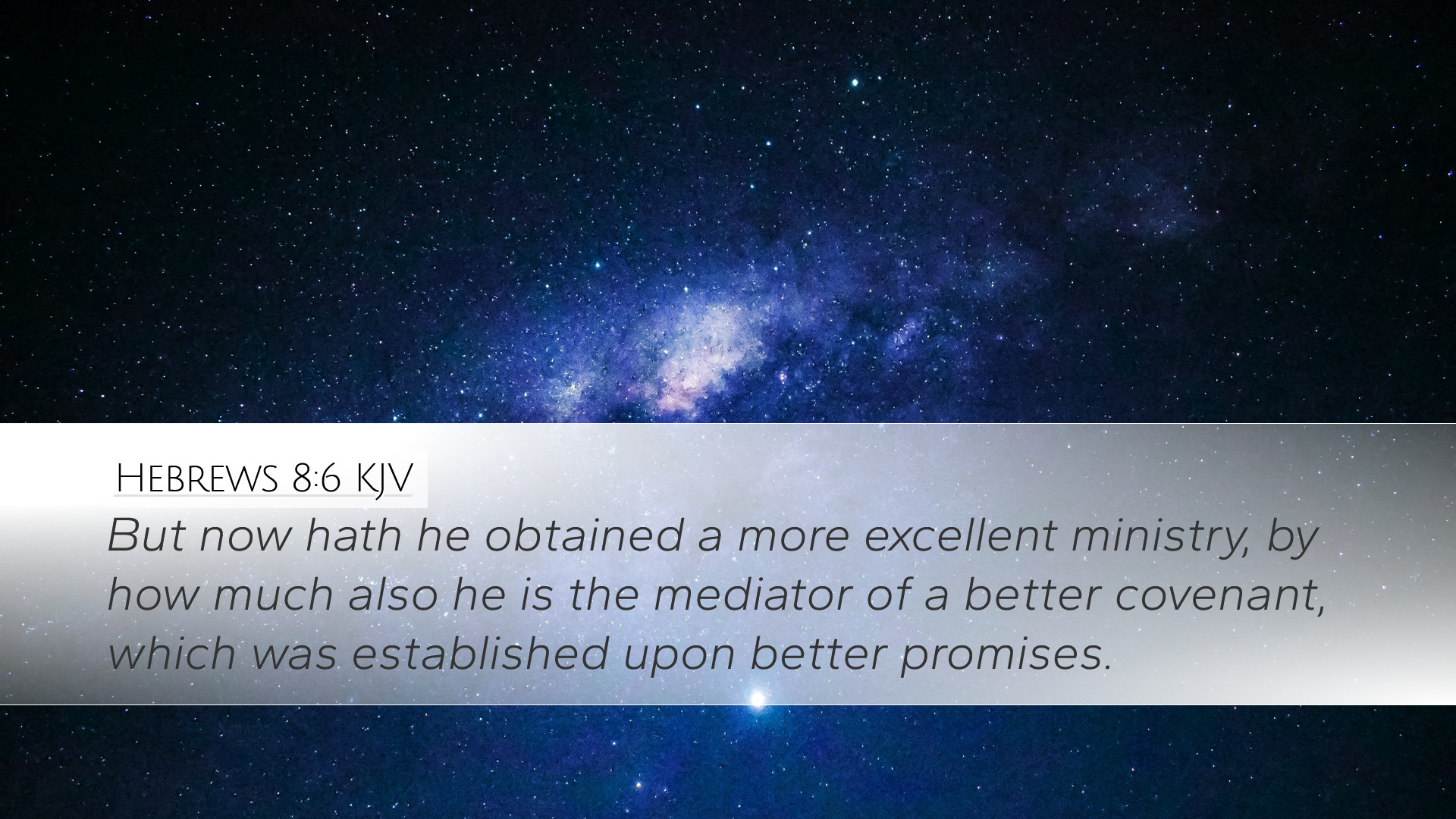Old Testament
Genesis Exodus Leviticus Numbers Deuteronomy Joshua Judges Ruth 1 Samuel 2 Samuel 1 Kings 2 Kings 1 Chronicles 2 Chronicles Ezra Nehemiah Esther Job Psalms Proverbs Ecclesiastes Song of Solomon Isaiah Jeremiah Lamentations Ezekiel Daniel Hosea Joel Amos Obadiah Jonah Micah Nahum Habakkuk Zephaniah Haggai Zechariah MalachiHebrews 8:6
Hebrews 8:6 KJV
But now hath he obtained a more excellent ministry, by how much also he is the mediator of a better covenant, which was established upon better promises.
Hebrews 8:6 Bible Commentary
Hebrews 8:6 Commentary
Bible Verse: "But now He has obtained a more excellent ministry, by as much as He is also the mediator of a better covenant, which has been enacted on better promises."
Introduction
The epistle to the Hebrews meticulously reveals the superiority of Christ and His priesthood, particularly in relation to the Old Testament sacrificial system. Hebrews 8:6 occupies a significant space in this theological discourse, emphasizing the essential differences between the old and new covenants. In this exploration, various public domain commentaries will be synthesized to elicit a deeper understanding for pastors, students, theologians, and Bible scholars.
The Nature of Christ’s Ministry
Matthew Henry highlights that Christ’s ministry is characterized as "more excellent." This excellence arises from the function He performs as the mediator of a new covenant. Henry notes that unlike the Aaronic priesthood which served within the confines of the earthly sanctuary, Christ serves in the heavenly realm, thus making His ministry superior. He intercedes from the right hand of the Father, emphasizing the divine nature of His office.
Albert Barnes affirms this notion by elaborating on the term "more excellent." He suggests that it considers both the quality of the ministry and the new administration's spiritual authority. The covenant established through Jesus Christ provides a more perfect means of access to God, fulfilling the righteousness that the law could not achieve. Barnes elucidates that this new covenant brings forth transformational promises, changing the hearts of believers.
The Role of Christ as Mediator
Adam Clarke provides insight into the role of Christ as mediator. He elucidates that the mediating role of Jesus is critical in understanding the dynamics of the new covenant. Clarke posits that a mediator operates between two parties to facilitate relationship and reconcile differences; in this case, Jesus mediates between God and humanity. His atoning sacrifice fulfills the requirements of justice while extending grace, thus establishing a new basis upon which individuals can relate to God.
Both Henry and Barnes recognize that this mediation is rooted in the "better promises" encapsulated in the new covenant, marking a significant transition from the inadequacies of the former agreements in the Law.
The Better Covenant
The term "better covenant" encapsulates an extensive theology. Matthew Henry states that while the previous covenant outlined types and shadows, the new covenant is grounded in reality. Where the old covenant, established through the blood of animals, offered limited atonement, the blood of Christ secures eternal redemption.
Albert Barnes describes this covenant as one with "better promises." He explains how the promises of grace, forgiveness, and the indwelling presence of the Holy Spirit serve as defining attributes of this new agreement. The believer's experience is transformed as they are not only forgiven but are made new creations, empowered to fulfill the righteous requirements of the law.
Adam Clarke asserts that the better promises provide reasons for believers to rejoice and pursue holiness. This covenant is marked not by external adherence to the law but a heartfelt fulfillment of God's commandments through the work of the Holy Spirit.
Conclusion
Hebrews 8:6 presents profound truths that significantly impact our understanding of God's redemptive plan through Christ. The synthesis of insights from Henry, Barnes, and Clarke emphasizes the unparalleled nature of Christ’s ministry, His role as mediator, and the promises of the new covenant.
For pastors, students, theologians, and Bible scholars, the implications of Hebrews 8:6 serve not only as theological truths but as practical applications for faith and ministry. Recognizing Jesus as the mediator of a better covenant should prompt believers to reflect on their relationship with God and their commitment to live according to the newness of life provided through the Holy Spirit.


